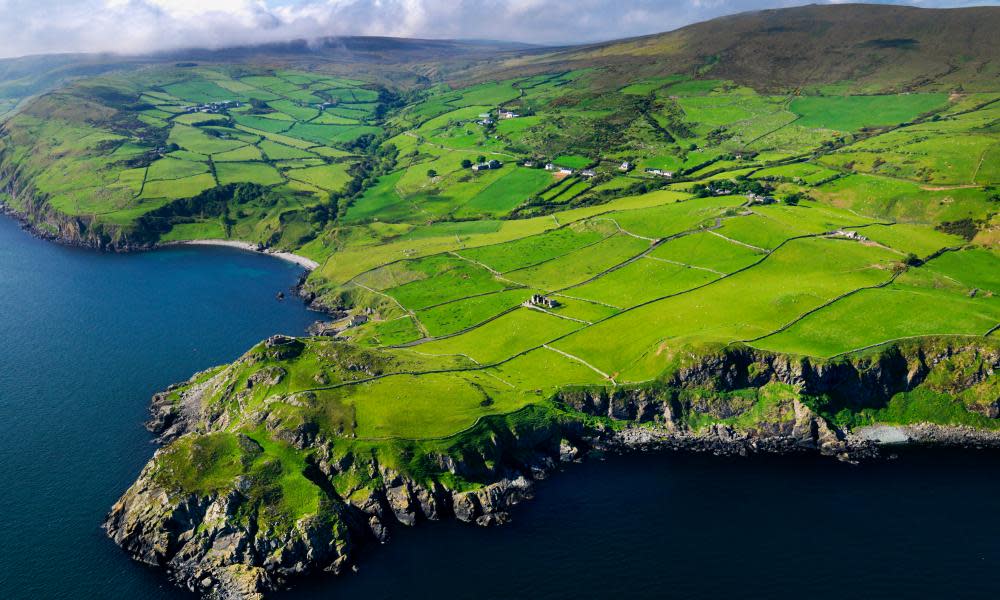Irish leader calls for united Ireland provision in Brexit deal

Ireland wants a special provision in any Brexit deal to allow Northern Ireland to rejoin the EU should it be united with the Republic.
The taoiseach, Enda Kenny, said in Brussels that the deal between the EU and the UK should include language that would allow the north to easily return to the bloc.
Kenny said the provisions that allowed East Germany to join West Germany and the EU “in a seamless fashion” after the fall of the Berlin wall offered a precedent.
Kenny said it was important that the terms of the Good Friday agreement, including what might happen if the island of Ireland was united, was part of any deal.
“In other words, that in such future time, whenever that might be, were it [reunification] to occur, that the north of Ireland would have ease of access to join as a member of the European Union again … We want that language inserted into the negotiated treaty, the negotiated outcome, whenever that might occur,” he said.
Speaking at a press conference after a meeting with the European commission president, Jean-Claude Juncker, and the EU’s chief Brexit negotiator, Michel Barnier, Kenny also said he believed that the triggering of article 50 would be “delayed a little”.
It had been widely assumed that Theresa May planned to start the talks at the European council meeting on 9 and 10 March. Kenny said: “We had expected the prime minister was going to move article 50 on a particular date; I think that might be delayed a little.”
Kenny brushed off questions about his own future, saying he was focusing on the political issues caused by the Brexit vote. He is rumoured to be considering stepping down next month after severe criticism of his handling of a crisis in the Irish police force.
Juncker offered Kenny his support, saying: “I will continue to work closely as possible with Enda in the next coming weeks and months and if something would happen which would lead me to be very very sad, relations would continue.”
Juncker said discussions between Kenny and Barnier had focused on all the issues that arose for Ireland from Brexit, including how it would be possible to avoid a hard border on the island of Ireland.
Juncker said: “We don’t want to have hard borders between Northern Ireland and the Republic, we don’t want to have the Good Friday agreement to put under risk, and we want land borders to be open as possible.”
Kenny said he had agreed with May that there would be no return to a hard border, but he said a concrete plan for keeping to the pledge could not yet be provided due to the lack of clarity on the UK’s aims with regard to membership of the customs union.
He said: “We had a discussion particularly about the border and the peace process. I made the point that when the old style of the border existed you had sectarian violence.
“We agreed with the British government and the British government agree with us: there should not be a return to the hard border of the past and indeed there won’t be. This is a political challenge as distinct from any technological issue.
“Obviously Michel Barnier and his taskforce can’t deliberate on an outcome until [article] 50 is triggered and until we know with clarity what it is the British government is talking about in terms of future relationships with the EU, because that will have an impact on trade with Ireland.”
Kenny said Ireland and the EU needed to know what May’s hopes were “in terms of customs union membership or associate membership”. And while emphasising the good standing of relations between Ireland and the UK, Kenny added: “We sit on the European negotiating side of the table when this actually starts.”
At the end of the press conference the two men were asked which one of them would resign first. Kenny shrugged off the question, saying he was focusing on the issues at hand.
Juncker, who is rumoured to have considered quitting over a lack of support among member states for his vision of the EU’s future, said: “I will not resign, I will bring my mandate to an end, that is 3 November 2019, but you knew that anyway.”

 Yahoo News
Yahoo News 
